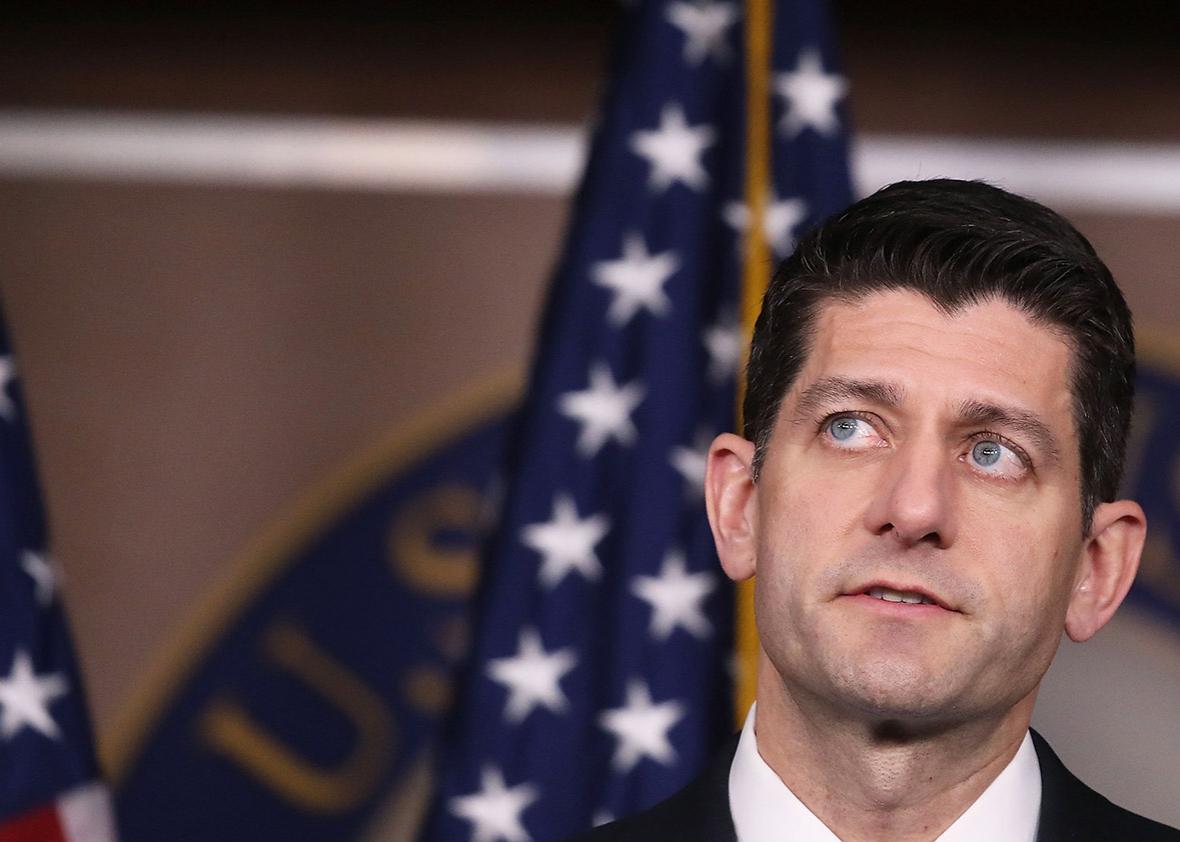If you listened to and then believed Republican leaders on Capitol Hill, then you might think that the American Health Care Act was not, in fact, dead following last week’s extraordinary implosion. Despite seeming to acknowledge on Friday that Obamacare is the law of the land, they are now trying to message that the repeal fight goes on.
If the zombie health care bill is ever brought to a vote, though, it will not be because moderates and conservatives finally found the silver bullet policy tweak that doesn’t exist. It won’t be because a wildly unpopular bill suddenly got the facelift that no surgeon can offer. It would be because the House Freedom Caucus is successfully guilt-tripped and shamed into coming around. The message from Capitol Hill leaders and the White House on Thursday, as rumors spread of health care reform not being quite dead yet, was crisp: The choice on whether the corpse of Trumpcare is resurrected is up to the Freedom Caucus.
In other words, don’t hold your breath.
Donald Trump, who’s been jabbing the Freedom Caucus periodically on Twitter, took a full swing Thursday morning. “The Freedom Caucus will hurt the entire Republican agenda if they don’t get on the team, & fast,” the president tweeted. “We must fight them, & Dems, in 2018!”
Meanwhile, House Speaker Paul Ryan, with a somewhat gentler touch, warned in a CBS interview of the potentially apocalyptic damage the nation could sustain if the Republican conference doesn’t unite soon: a bipartisan health care bill.
“What I worry about,” he said, “is if we don’t do this, then [Trump will] just go work with Democrats to try to change Obamacare. And that’s hardly a conservative thing.” Try to picture, for even a second, a world in which enough Democrats and Republicans struck a deal that preserved Obamacare’s foundation and put an end to the health care wars of the last eight years, allowing the political system to move onto other issues once and for all. Is this a world anyone would want for their grandchildren? This is a choice the Freedom Caucus members, Ryan implied, will have to make.
The House committee chairmen charged with writing the American Health Care Act are making clear that this is out of their hands, too: If the Freedom Caucus’ “no” votes decide they’ve had a change of heart, they can come and tell the committee.
“There are members who have, informally, reached out to others in an organic way to find out if there are ideas out there where members who could not get to yes have ideas that could get them to yes,” Texas Rep. Kevin Brady, chairman of the Ways and Means Committee, said Thursday. “Those conversations will continue.”
“As for me,” he continued, “we are turning our attention to tax reform.”
Oregon Rep. Greg Walden, chair of the Energy and Commerce Committee, acknowledged that there’s “a lot of talk going on,” but it’s out of his control for the time being. “I think I will [know] before any [vote] happens,” Walden said, “but at this point I’ve heard nothing on it.”
That chatter about members reaching out to one another “in an organic way” that Brady was alluding to may be sort of a one-way street. The Freedom Caucus, which still very much wants to repeal Obamacare, had been trying to reach out to the Tuesday Group moderates, who are over it and decided Wednesday night not to negotiate with the Freedom Caucus.
“We have never negotiated with the Freedom Caucus,” New York Rep. Chris Collins, a close Trump ally and Tuesday Group member, said Thursday. “We are not currently negotiating with the Freedom Caucus. There was never a meeting scheduled with the Freedom Caucus. We will never meet with the Freedom Caucus.”
To be certain reporters understood, Collins continued:
There was never a meeting scheduled—there never was, never will be. This is the Freedom Caucus looking for a scapegoat, and trying to shift the blame and suggest in any way that the Tuesday Group bears responsibility for this is just false.
Where does this leave the Freedom Caucus? Isolated in timeout by the White House, the House leadership, the House moderates, and the House rank-and-file until they decide they want to swallow their pride and vote for a bill that the others can stomach. It’s a guilt trip.
How’s that working for them?
“That won’t work,” said Arizona Rep. Trent Franks, a Freedom Caucus member. “We’ve been guilt-tripped by the best of ’em. We’ve been guilt-tripped by guys … well, half Mr. Trump’s size.”
“We just made promises to the American people,” Virginia Rep. Dave Brat, another Freedom Caucus member, said when asked about what effect the pressure might be having. “We’re just holding true on our promises. So it’s not about drama or guilt or whatever. We all promised, as outsiders, to clean the swamp.”
Other conservatives were less diplomatic Thursday morning about how they view the pressure campaign.
I asked Collins if there was any realistic chance of a vote on a health care bill before the April recess begins at the end of next week.
“No,” he said flatly.
A few weeks back home with the constituents in April should offer some clarity to Freedom Caucus members. If they’re greeted as heroes for refusing to vote for “Ryancare,” they won’t budge, and there will be no health care bill. If they’re treated as failures who let President Trump down, then the guilt trip might start producing its desired effect. Which way could that go? Well, pressure campaigns are usually more successful when the end goal isn’t passing a bill polling at 17 percent.
